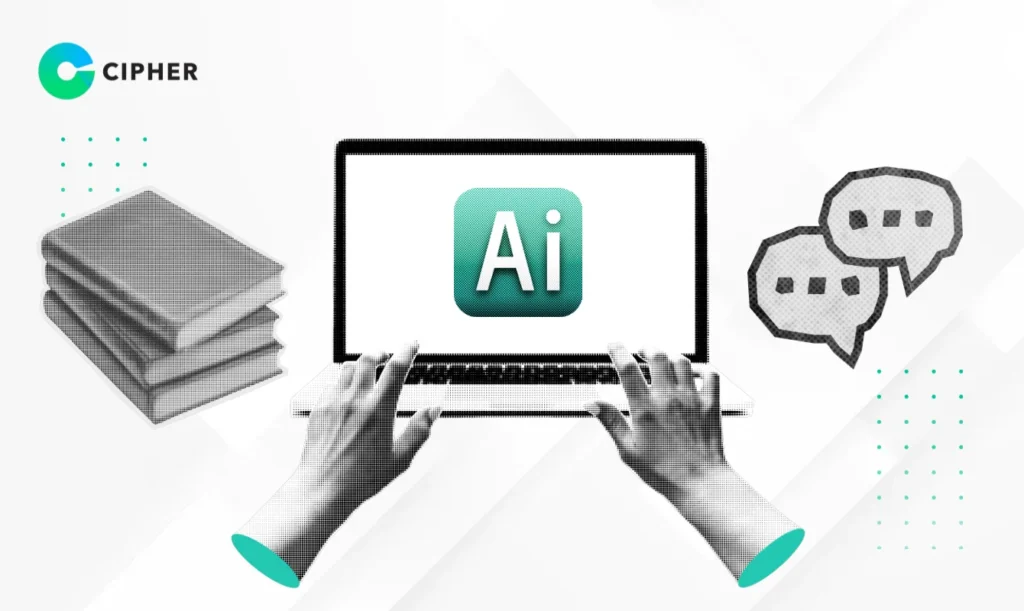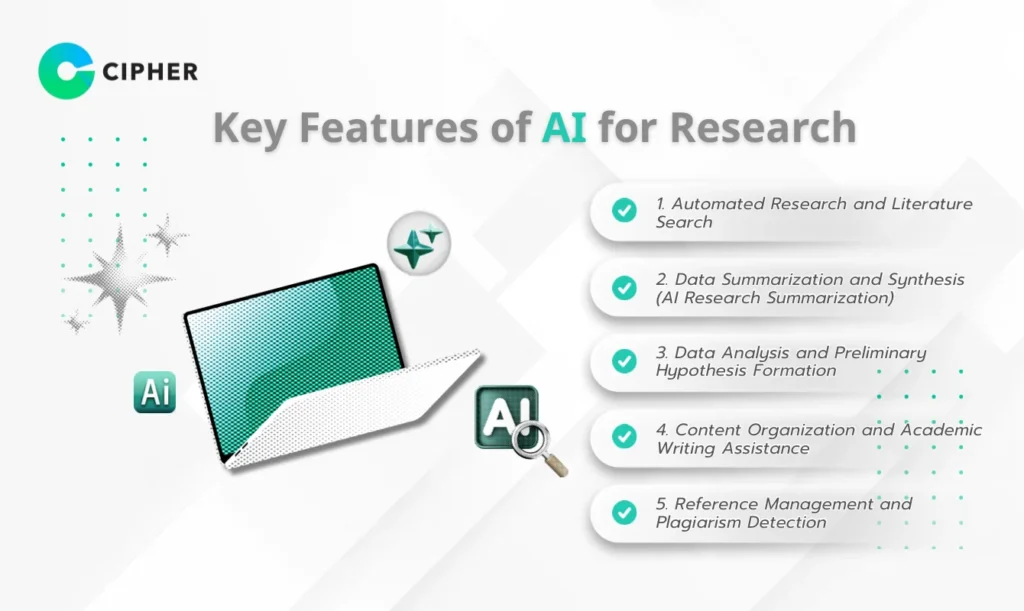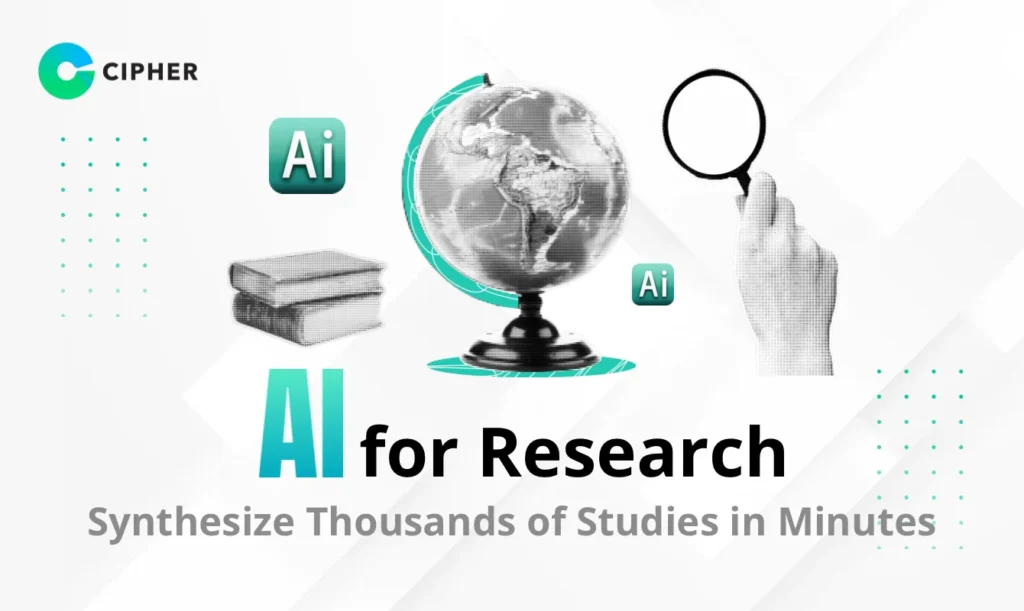Research and academic work have transformed dramatically in the modern era. Researchers no longer need to spend days searching through library documents or wasting time reading numerous research papers. Today, AI for Research has revolutionized the research industry completely, helping researchers work faster, more accurately, and more efficiently.
In this article, CIPHER, experts in software development and Digital Marketing, will introduce you to AI for Research that is transforming academic landscapes worldwide.
Table of Contents
What is AI for Research?

AI for Research refers to artificial intelligence technology developed to assist in academic research processes, from searching and collecting data, analyzing complex information, to writing and presenting research results. It utilizes capabilities in big data processing, pattern learning, and meaningful content creation.
Currently, academic information is increasing enormously, making AI for Research an essential tool that helps researchers efficiently manage this vast amount of data.
Why AI Has Become an Important Assistant in Modern Research
The academic world is facing growing volumes of information, requiring researchers to keep up with numerous newly published research papers. Reading and understanding all research articles personally has become impossible. The role of AI in Education or artificial intelligence for education has stepped in to solve this problem by:
- Saving time in research and data summarization
- Helping discover connections between research that humans might overlook
- Analyzing large amounts of data quickly and accurately
- Improving research quality by reducing human errors
Key Features of AI for Research

1. Automated Research and Literature Search
Literature review is an important but time-consuming step in research. AI Tools for Researchers can scan and search for relevant research articles from large databases quickly, helping researchers find comprehensive and relevant documents without missing important research.
Some tools can also create networks of connections between various articles, helping researchers see a clearer overview of research in that field.
2. Data Summarization and Synthesis (AI Research Summarization)
One of the most outstanding capabilities of AI Research Summarization is reading and summarizing content from numerous research articles. AI can extract key issues, research methodologies, results, and conclusions from articles quickly, helping researchers understand content without reading entire articles.
Additionally, AI for Research can create comparison tables of research results from various articles to clearly show similarities and differences, making research synthesis more efficient.
3. Data Analysis and Preliminary Hypothesis Formation
Software AI Software for Research can analyze large and complex data quickly, find patterns or relationships that might not be clear to humans, and assist in forming preliminary hypotheses.
AI can help create mathematical and statistical models to predict future event trends, enabling researchers to form highly probable hypotheses and design efficient experiments.
4. Content Organization and Academic Writing Assistance
Academic writing is a skill requiring both knowledge and experience. AI for Research can help structure articles, suggest writing improvements, and check grammar and language usage.
Moreover, AI in Education also helps solve language problems for researchers who don’t use English as their first language, increasing chances of publication in international journals.
5. Reference Management and Plagiarism Detection
Correct referencing is important in academic work. AI for Research can help manage reference systems correctly according to journal requirements and check for literature plagiarism to ensure work originality.
AI tools can check similarities with existing research and alert if text potentially constitutes plagiarism, helping researchers avoid ethical issues in research.
Recommended AI Programs for Research
There are various AI Software for research to choose from according to needs and work characteristics. The following are AI Tools for Researchers that are popular and highly efficient:
- SciSpace Copilot: A platform that helps search and collect research articles published between 1800-2023 in open access format, with Chatbot that helps answer questions and explain content in research articles, including explaining tables and images.
- Semantic Scholar + AI Assistant: An academic article search tool using AI to help find relevant articles accurately, with AI Assistant features that help summarize and analyze articles.
- Elicit: A tool that helps search research papers, summarize important information, and answer specific questions from relevant research.
- ChatGPT + Research Plugins: Using ChatGPT with research plugins helps efficiently search for information, summarize articles, and assist in research writing.
- Claude AI: A language model by Anthropic that excels in deep understanding and providing careful answers, suitable for analyzing academic articles, logical Q&A, and summarizing content requiring high accuracy in research.
- Scite: A tool that helps analyze research article citations, showing whether articles are cited in contexts that support or contradict original research results.
- Research Rabbit: A tool that helps find relevant articles by creating citation networks and showing connections between various articles.
These tools help researchers work more efficiently, save time in searching and analyzing data, which is highly beneficial for research in the digital age.
Benefits and Opportunities of Using AI in Research
Using AI for Research has many benefits that help elevate research quality and increase work efficiency, including:
- Time-saving in research: Reduces time spent searching and reading research articles from several days to just a few minutes, allowing researchers to dedicate more time to analyzing and interpreting data.
- Broader access to information: Helps researchers search and access research from around the world more easily, not missing important research that might affect the study.
- Discovering hidden connections: Can see complex patterns and relationships in large amounts of data that humans might overlook or take longer to discover.
- Improving writing quality: Helps improve academic writing, especially for researchers who don’t use English as their first language, increasing chances of publication in international journals.
- Reducing errors in data analysis: Helps check and analyze statistical data accurately, reducing errors that might occur from human fatigue or lack of expertise.
Precautions When Using AI for Research
Although AI for Research is very beneficial, researchers should be aware of limitations and various risks:Although AI for Research is very beneficial, researchers should be aware of limitations and various risks:
- Accuracy and bias: AI provides good information when there are sufficient and diverse sources but may have limitations in specialized fields or cutting-edge research. AI might create seemingly credible information that doesn’t actually exist, such as referencing non-existent articles or creating fake author names, which will reduce academic credibility.
- Cannot replace human judgment: AI still cannot analyze deeply or have human-like creativity. Research still requires human researcher perspectives and judgment to interpret and create new knowledge.
- Plagiarism issues: Copying content created by AI without checking or modifying may constitute academic plagiarism, which is a serious violation of research ethics.
- Publication limitations: Most academic journals still don’t accept AI as a co-author in research articles and may have strict policies regarding AI use in manuscript preparation. Researchers should carefully study the policies of journals they wish to publish in.
- Privacy and data leakage: Uploading unpublished research data to AI platforms may risk data leakage, especially in sensitive research or research involving personal data.
Ethical Guidelines for Using AI in Research
To use AI for Research efficiently and ethically, researchers should follow these guidelines:
- Always verify information: Don’t accept AI results as complete “truth” without verification.
- Disclose AI use: Inform which parts of the research used AI.
- Use AI as a helping tool, not a worker replacement: AI should help you think and write better, not think or write for you.
- Maintain data privacy: Don’t input data you don’t want to share into AI.
- Evaluate results with critical thinking: Consider AI results carefully before using them.
CIPHER's Services Related to AI for Research
CIPHER Company Limited is a company with expertise in IT Solutions and Digital Marketing, offering services related to AI for Research to help researchers and educational institutions fully utilize AI technology.
CIPHER’s services related to AI in Education and AI for Research include:
- Specialized AI Software Development: Developing AI systems specifically designed for research in various fields.
- Research Data Management Systems: Developing systems to store and analyze large research data.
- AI-powered Online Learning Platforms: Creating learning and teaching systems that use AI to assist in learning and research.
- Training on AI Use in Research: Organizing training for researchers to efficiently use AI tools.
With an expert team and experience working with leading organizations in both public and private sectors, CIPHER is ready to provide consultation and develop AI solutions that precisely meet the needs of researchers and educational institutions.
Conclusion
AI for Research is a powerful tool that is transforming the research landscape worldwide, helping researchers work more efficiently, from searching for information, analyzing, to writing and presenting results.
However, using AI Research Summarization or AI Tools for Researchers must come with understanding of limitations and responsibilities. Researchers should use AI as a helping tool, not a worker replacement, and must always verify information accuracy.
If you need advice on using AI for Research or want to develop AI systems for your institution, CIPHER Company is ready to provide consultation and services that meet your needs.
Frequently Asked Questions
What is AI for Research, and how does it help researchers?
Which AI tools are suitable for research?
Examples of popular AI tools for research include:
- ChatGPT + Research Plugins: Search for information, ask questions, and help write content.
- SciSpace Copilot: Read articles, analyze tables, and answer questions from content.
- Elicit: Search for relevant papers and help summarize important information.
- Research Rabbit: Show connections between research in graph form.
- Semantic Scholar + AI Assistant: Search academic articles accurately with AI help for summarization.
- Claude AI: Understand content deeply, answer questions carefully and accurately.
- Scite: Analyze citation contexts whether they “support” or “contradict” the original research.





